Jonah Hill: importance of being earnest
Jonah Hill has written and directed one of the best movies of the year, Mid90s. Don’t be so surprised!
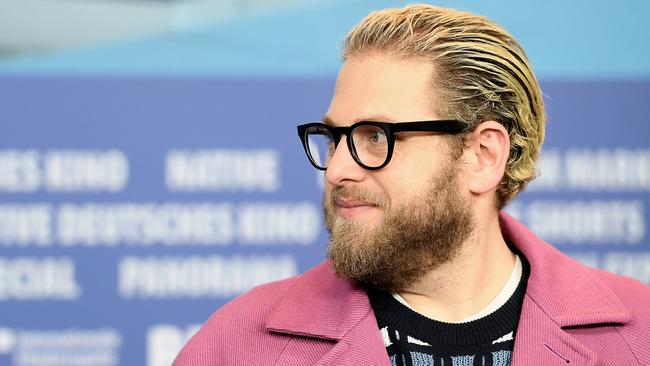
Jonah Hill wrote and directed one of the best movies of the year.
Yes, Hill. I could regale you with all the reasons that any surprise over the strength of Hill’s debut feature is unfair — rude, really — because while Hill, 35, may have launched to fame in 2007 as a smart-arse comic imp in Superbad, he quickly and nimbly repositioned himself, still in his 20s, into a brilliant character actor, working with some of the greatest directors.
I could yank up the IMDb to show Hill has collaborated with, among others, Judd Apatow (in The 40-Year-Old Virgin; Knocked Up), Bennett Miller (Moneyball), Quentin Tarantino (Django Unchained), Martin Scorsese (The Wolf of Wall Street) and the Coen brothers (Hail, Caesar!) — what Hill refers to as “the best film school in the world”.
I could remind you Hill has been nominated for best supporting actor Oscars twice — as Brad Pitt’s numbers-crunching protege in Moneyball and as Leonardo DiCaprio’s drug-vacuuming consigliore in The Wolf of Wall Street.
But I know how it is. I could tell you all these things and you’d still come back to me with a look: Hill wrote and directed one of the best movies of the year?
This is how narratives develop. And it is pretty crazy, even to Hill, what’s happening now. Sometimes you interview people in the movie business and it’s clear that, while they may like the film they’re promoting, it’s a job, and they have their stories and quotable lines dialled in and soon will be on to the next shiny object.
Hill does not give off that impression. Making Mid90s seems to have filtered deeply into his bones.
“I just want to make things from my heart,” Hill says.
“That’s all I care about, making things. If there’s a great part, I’m lucky enough to get a great part. If I’m lucky enough to write another film that means something to me and direct it … I want to make things with people I love.”
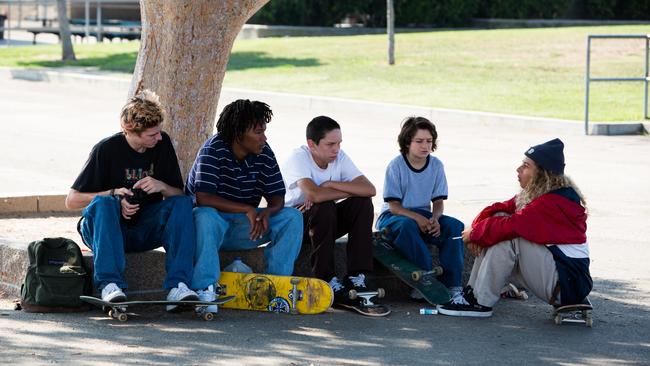
It’s the kind of earnest mission statement that might have provoked Hill’s Superbad character, Seth, to bang his head against a locker door.
But after a few minutes with Hill you realise this Hill is closer to the real one. In conversation, he is self-aware, sensitive, effusive. He gushes. He loves. If you’re expecting a snarky quip machine, you’re going to be disappointed.
“Jonah has this openness,” says Hill’s good friend Emma Stone, who starred with him in Superbad and recently reunited with him in the surreal Netflix series Maniac.
“I’ve always felt so loving and connected to him because whenever we’d talk it was just the most raw, sweet thing — the way he expressed himself. I love that quality in people. It’s rare.”
Hill’s new film is putatively about a small group of teen skateboarders in Los Angeles. But skateboards are just an entry point. Set before the millennium, as its title says — pre-iPhones, pre-Yeezys, pre-everyone being terrible to each other on social media — Mid90s is really an immersive look at male adolescence and all its conflicting joys and toxicities.
It owes more than a small debt to Kids, director Larry Clark and screenwriter Harmony Korine’s gritty firecracker about New York teens. (It’s a knowing homage; Korine has a cameo in the film.)
Released in Australia next week, Mid90s is not as bleak as Kids but it does not airbrush the skateboard scene like a Mountain Dew commercial.
Hill’s movie harks back to an era when the activity was rough, DIY and marginalised, illegal in some settings and definitely not cool with every parent.
Mid90s tells the story of Stevie (played by Sunny Suljic), an undersize kid with a single mom (Katherine Waterston) and a menacing older brother (Lucas Hedges) who finds comfort in a crew of skaters at a local shop.
The film roiled around inside Hill for years. He’s friends with director Spike Jonze and for a time he tinkered with a script and talked with Jonze about the project, reshaping the idea (originally the story was told in flashback).
Directing appealed to Hill, but he hadn’t quite summoned the nerve until he went to see then 29-year-old director Damien Chazelle’s Whiplash with Jonze and Miller, who directed him in Moneyball. As Chazelle’s name flashed on the screen, Hill says, “Bennett turned to me and said, ‘That guy’s younger than you … you better get to it.’ ”
Hill smiles. “That’s what really kicked my arse into gear. I have to thank Damien Chazelle if I ever meet him.”
Hill is an LA kid who grew up in an LA family not deeply into show business but close enough. An oft-repeated detail of his bio is that his father, Richard Feldstein, served as an accountant for rock clients including Guns N’ Roses.
This is not as exotic as it sounds, Hill warns. “My dad said, ‘[In LA,] even if you’re a dentist, you’re the dentist for so-and-so.’ ”
Hill’s mother, Sharon Lyn Chalkin, worked for a period as a costume designer and in other jobs on set. His kid sister, Beanie Feldstein, is an actress who played Saoirse Ronan’s best friend in Lady Bird. (“It’s a good thing I can direct because once the world discovers her, there’s really no use for me,” Hill says of Beanie.)
Hill’s older brother, Jordan Feldstein, was the manager of Maroon 5, helping propel the LA act to global stardom. Jordan died suddenly last year of a heart attack at age 40.
“I love him and I miss him very much. And that’s really all I’m gonna say about that,” Hill says of his brother.
Like his Mid90s protagonist, Stevie, Hill was drawn to skateboarding in his childhood — he describes himself as enthusiastic but “not very good”.
“Still, it came into my life at a time where I really needed it,” he says. “It was a group of outsiders who found one another.”
Mid90s ripples with hyperprecise period details and cameos that will please the hard-to-impress skate crowd. But what really pops is its cast. Hill turned to real skaters, with limited or no acting backgrounds, and coaxed moving performances from all of them. He hunted for talent in skate parks — it’s where he found Suljic, who had to skate worse than he’s capable of to play the newbie Stevie.
Given the youth and lack of experience, camaraderie was important, Hill says. He had flashbacks to Superbad, when he was barely under way as an actor.
“Now I am the old guy at the table,” he says, laughing. “Like the dad. Everyone’s sitting around at lunch roasting each other, it’s so fun.” One day Hill noticed one of the skater-actors, Olan Prenatt, looking pensively at something below the table. “I look down, and he has his rumpled script under the table, and he’s working his arse off,” Hill says. “I went outside and cried. I was emotional. He worked so hard.”
Mid90s moves fluidly and crackles with life — to the point it seems improvised, but it’s almost all in Hill’s script.
“There’s lot of work in naturalism if it’s not natural,” Hill says.
There’s a scene midway through the movie that speaks to this achievement. Stevie and the crew have come to a local skate hangout teeming with life — skaters doing tricks, homeless people clustered on the outskirts. There’s a moving interaction between Stevie’s crew and a homeless man, but what’s most striking about the scene is all the concurrent action — there are a 1000 things happening at once, all around, and the scene envelops you, as if you’ve parachuted into a real-life skate world.
Hill says the moment was at least partly inspired by his time around Scorsese in The Wolf of Wall Street and how the 75-year-old director and his cinematographer Rodrigo Prieto laboured to create elaborate, artful scenes.
“You do so much work to build this thing that by the time the actors get there they don’t know a movie’s happening,” Hill says.
On Wolf “I would walk in with Leo (DiCaprio) and we’d shoot. But Rodrigo and Marty, they’d done the work.”
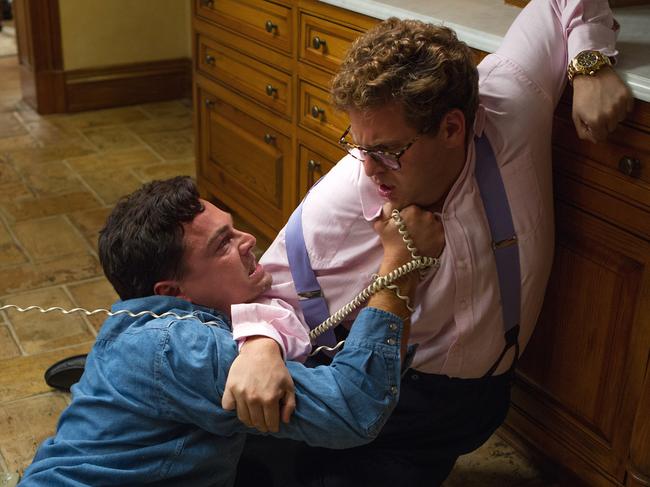
Could Hill be planning to walk away from acting to focus on directorial work? Acting remains part of his agenda, Hill says — he just needs a good reason to do it.
For Netflix’s Maniac, a darkly comic series in which Hill and Stone play troubled souls seeking inner peace in a radical pharmaceutical trial, his reason was simple: he wanted to work with his friend Emma again.
“Honestly, I wanted to hang out with her,” Hill says.
The pair had not worked together since Superbad — Stone’s first movie — and one of the many odd pleasures of Maniac is seeing how far Superbad’s Seth and Jules have come in the decade since home economics class.
Hill and Stone now have four Oscar nominations between them, with Stone winning best actress last year for La La Land, which was directed by Chazelle, who inspired Hill to direct Mid90s.
“She’s unbelievable,” Hill says. “To see how she’s flourished as an actor?” He shakes his head.
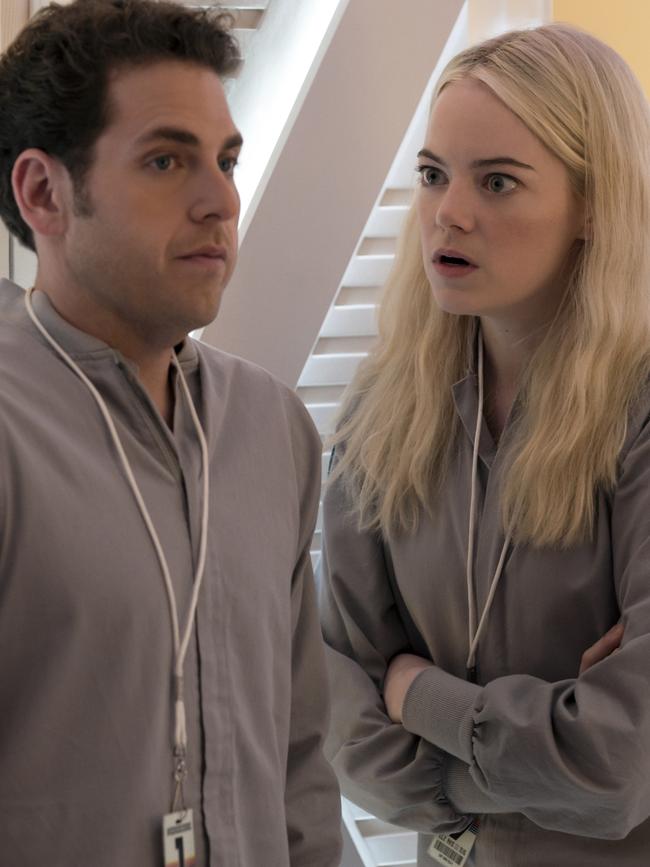
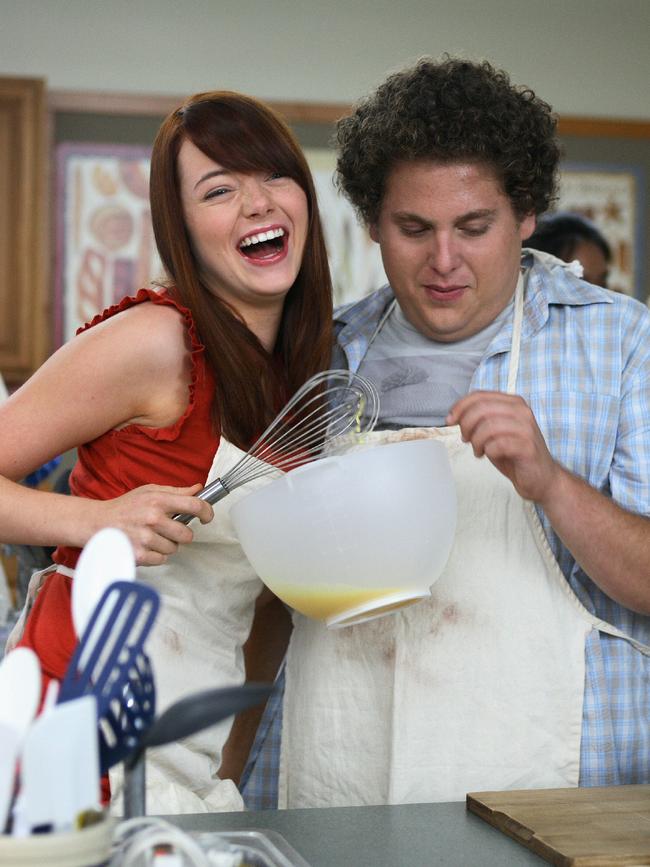
Before we go, I would be remiss if I didn’t address Hill’s side life as a style maven. In the Instagram era, he has become something of an exemplar of unselfconscious cool, mixing hypercurrent streetwear with sui generis personal touches.
For the past couple of years fans have gathered in Brooklyn to celebrate Jonah Hill Day, which Hill himself attended this summer (and showed up an hour early for, awkwardly).
Sometimes he will purposely have fun with it — as in the case of a Phoenix Suns basketball jersey, which he ridiculously tucked into his pants before going for a walk.
Photos of a smiling Hill in the curious get-up went viral.
“I was trying to make my sister laugh,” he says now. “It was me playing with everyone. That’s me commenting on the joke.”
It’s such a strange planet. A famous man can walk outside in a funny shirt and a few hours later it’s a global sensation, shared like photos of a moon landing.
“More people will see that than (Mid90s)!” Hill exclaims.
The Wall Street Journal
Tomorrow in Review David Stratton’s verdict on Mid90s
